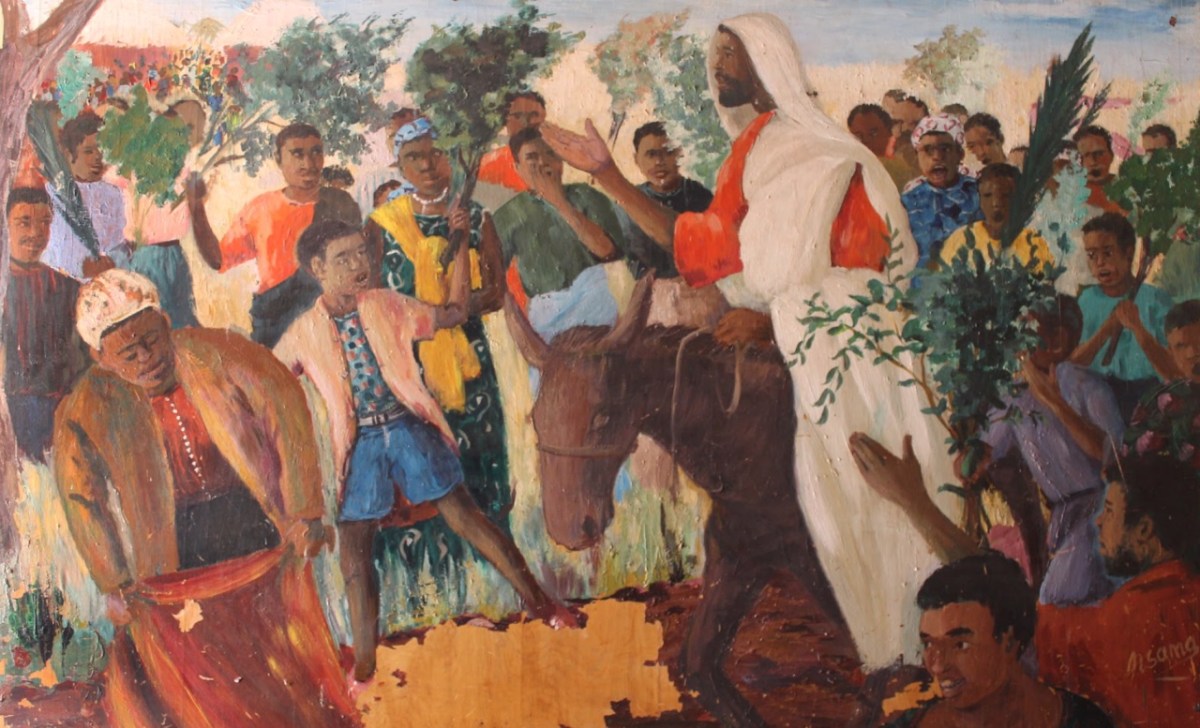I preached this sermon on Palm Sunday, March 28, 2021 at Trinity Episcopal Church, Fort Wayne, IN. The lectionary text cited is the Passion narrative in Mark 14:1-15:47. The image at the top of this post is Triumphal Entry (1969), by Zambian artist Emmanuel Nsama.
We have just heard a story that is, for most of us, deeply familiar. We gather, year after year, during this holiest of weeks to hear it again, to immerse ourselves in the narrative—one that begins today clutching our palm fronds with an exultant crowd at the city’s edge and has just ended at the lonely tomb where only a few brave women dare to visit.
But rather than pick apart this story, rather than analyze and intellectualize its themes and symbols from a comfortable emotional distance, I wonder whether we ought to simply let it speak for itself. I wonder whether it is a story best received and held with humble, pregnant silence, as all truly important stories ought to be received.
For the one thing that we do know about this story, this passion narrative, is that it is of deep importance—that it reaches out to speak into the most hidden parts of ourselves. It is a story that observes us, that comments upon us, rather than the other way around. This story knows us and names us in ways we might not want to be known—our hopes, our fears, our terrifying capacity for callousness— and reminds us why we so desperately need God’s saving love in the first place.
So at the outset of this Holy Week, as we summon up the courage to sit with this narrative that is both familiar and shocking, I simply ask you to ponder this question: what if this passage, this passion narrative that we just heard today, was the end of the story? What if that was it?
What if Jesus, the Son of God, the miracle worker and prophet and teacher of peace and radical inclusiveness, who rode into Jerusalem as a new sort of king, was simply put to death and laid to rest and then…nothing. What if the story ended here—as it does for most of us in this life—with the stone sealing the tomb?
I ask this for two reasons. First, because in order to let Holy Week do its work upon our hearts, we must try take it as it comes and not skip ahead. We have to suspend, for a bit, our knowledge of what will come next Sunday and simply be present to what is happening in the moment of each liturgy.
So today, hear what Palm Sunday has to say to you. Don’t move on too quickly. We need to stand awhile in this crowd that cheers one moment and calls for blood the next, if only to recognize that we are not so very different from them. And in each of the days to come, as we take part in the Masses and read our daily reflections, let the story unfold, living it as the disciples did, as they followed Jesus into the city. Like the disciples, allow the events to disarray your certainties and upend your expectations of what success and significance mean. We will learn so much more from this week if we can somehow live it.
The second reason I ask what it would mean if the story ended here, at the tomb—is because for many people, Palm Sunday IS the whole, representative story of human life.
Without the eyes of faith, without the Divine inbreaking, Palm Sunday IS how the world tends to work—a place where the strong dominate the vulnerable, and the pursuit of peace is viewed as a farce, and mercy is called weakness and battle lines must aways be drawn and redrawn, age after age.
We live in a world that has been, for too many people and for too many generations, one long and unending Palm Sunday—and so it is easy to believe that this indeed is where the story ends, and that our longing for something else, something kinder, is a delusion.
That is the story that the world continues to try to proclaim to us and form within us. And if we’re not careful, we might buy into it, talking pleasantly enough about resurrection but living fearfully, meagerly, as if Jesus is still dead and buried in that tomb.
So on this Palm Sunday, and perhaps every day for the rest of our lives, we have a choice to make: is this the story that we are actually telling and living by our actions and words; are these the values that we are embodying? Are we, in fact, a “Palm Sunday” people?
Or do we dare to live as another type of people, people who have their hearts fixed on God’s promises, on God’s version of triumph–people who persist beyond today’s heartbreak?
Are we willing to tell a different story, a story that says there is something more to this life than trampled palm fronds and jeering crowds and the desolate silence of the grave?
That is the choice given to us, and this is the week when we must decide anew how deep into this story we are willing to journey.
Because yes, for today, we end here at the tomb. But come back tomorrow, and the next day, and on throughout all of Holy Week, and see what God can do with this broken body. See what God can do with your broken heart. Let this journey reveal its mysteries to you one day at a time, until the real ending comes—the ending that will be for us, in truth, only the beginning.


Father Phil, your sermons are deep narratives that can be felt in a personal and spiritual way. I will continue to read!
LikeLike
Thank you so much, Morvalyn. Every blessing to you this Holy Week!
LikeLike